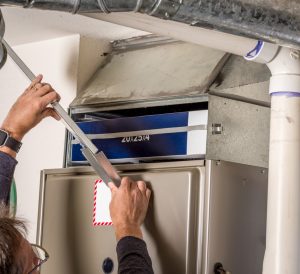It’s always a good idea to get a home inspection done before buying a house. The resulting report offers information as to current and possible future problems with a property. A home inspector notes any areas of concern and may refer you to another source for more information. Know what to watch out for and when to hire a professional for another opinion.
Mold
If there are any signs of mold the inspector will likely recommend mold remediation and inspection by a licensed professional. The home inspector likely won’t be able to differentiate mold vs mildew or comment on how dangerous it is. Regardless of the type, mold and mildew present health risks and should be treated at the source.
Water Stains
Any signs of water damage are an immediate cause for concern and are typically noted on the inspection report. Water staining can indicate plumbing problems or improper drainage. Depending on the age of the problem, more damage could be hiding behind drywall.
Electrical Issues
If your home inspector notes flickering lights or non-functioning outlets consider hiring an electrician. Not only can they fix these problems, they can also tell you if the home’s wiring is a fire hazard and needs to be replaced. This can be an expensive process and knowing in advance will help you decide if the home is right for you.
Structural Concerns
A home inspector may point out signs that there could be problems with the foundation. Bulging walls, sagging floors and loose drywall can all indicate serious issues. Have a structural engineer take a look to diagnose and estimate the cost of any repairs. Foundation issues can be extremely costly to fix so don’t ignore this section of the report or assume you’ll take care of it later.
Pest Problems
Evidence of insect carcasses or termite tubes may indicate a larger infestation. If your report shows any sign of pests, further inspection can determine how serious the problem really is. A longstanding untreated termite infestation may have caused serious structural damage, for example.
Improper Grading
No one wants to be surprised by a wet basement the first time it rains. The culprit is often improper grading, meaning the lawn slopes down towards the house rather than down and away from the foundation. It’s hard to gauge proper grading yourself unless the problem is glaringly obvious. If your inspection report notes signs of leakage or water damage in the basement make sure you determine the source.
Asbestos
The mere presence of asbestos in a home doesn’t necessarily signal a health hazard. Homes built prior to 1950 may contain asbestos insulation but as long as the material is in good shape and undisturbed the risk is minimal. Asbestos can also be present in floor tiles, furnace ducts and soundproofing materials. If you are planning renovations in a home containing asbestos be aware that you could be facing a hefty bill for removal.
Radon
Not all home inspectors are qualified to test for radon so most of the time you’ll need a separate inspection. Smokers and former smokers are more susceptible to radon’s lung-cancer causing effects but given how simple testing and remediation are, everyone should monitor their home for radon.
Roof Problems
Missing shingles or leaks could signal big problems with a home’s roof. A roofing contractor will be able to tell if the issues are minor or require an entire replacement. A few missing shingles could be cosmetic but could also signal rot or structural damage underneath. Paying for a quick inspection by a roofer could save you the cost of a roof replacement later.
Deferred Maintenance
If your inspector notes multiple instances of necessary repairs on the home consider whether you’re willing to put in the time and money required to get the house back to satisfactory condition. A home that has been neglected for the last twenty years may be hiding more problems you can’t see yet.
A home inspection provides useful information about your potential new home. Read it carefully and consult with other professionals if red flags are present. Knowing the true source of common problems will help you determine if a house is really right for you or if you should walk away.



